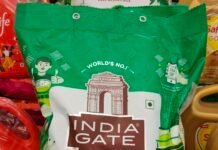
Not many know that Surya Foods is also present in the juice market. Known as a biscuit, confectionery and chocolate manufacturer Surya Foods started off in November 1992 and launched its Priyagold biscuit brand in October 1993. The company has established strong biscuit manufacturing capabilities and invested substantially in developing consumer preference for its products. Its brands ‘Haq Se Maango’ and ‘Priyagold’ are now powerful FMCG brands. The company has six plants in Greater Noida, Lucknow, Surat, Haridwar, Jammu, Hyderabad and has diversified to upmarket biscuits and chocolates as well as fruit
juices under the Treat and Fresh Gold brand names.
 The juice brands are doing well. “During peak season of the year, the four Tetra Pak lines installed six years ago, produce about 1.5 crore (15 million) juice packets every month. A year ago, we have also added PET bottling lines for juice packaging,” says Shrey Agarwal, director of Surya Fresh Foods.
The juice brands are doing well. “During peak season of the year, the four Tetra Pak lines installed six years ago, produce about 1.5 crore (15 million) juice packets every month. A year ago, we have also added PET bottling lines for juice packaging,” says Shrey Agarwal, director of Surya Fresh Foods.
“The juice market is growing and in the food industry, you will not be able to grow simply by sticking to a single category. We see a good potential in the juice market which is growing at 10 to 15% per annum and that is one of the reasons whey we diversified to the juice segment. The aim is to make our juice products one of the best brands at a regional level while competing with regional companies,” says Agarwal. At present, Surya Foods supplies its packaged juice to about 19 Indian states with plans to expand in North East India with a new plant. Agarwal says, “The transportation cost to the nooks and corners of the North East is high and hence we are planning to start a new plant there. Gradually, we will have a pan-India presence and add another new plant in South India.”
Biscuit packaging – flexibles and monocartons

According to BP Agarwal, chairman, Surya Fresh Foods, the company produces 600 tonnes biscuits, cookies, chocolates and cakes daily. “The biscuit plant in Greater Noida is one of the biggest biscuit plants in Asia,” says Dinesh Prasad, plant manager of the print and packaging division at Surya Foods. “We produce and pack 11 varieties of biscuits simultaneously and that is no small thing.”
The adjacent flexible packaging plant converts around 300 tonnes of flexible material monthly for packaging of Surya’s biscuits and has two 8-color Rotogravure presses – an ExperPac 4000 with electronic line shaft installed in 2011 which runs at 300 metres a minute and an ExperPac 2000 with a rated speed of 200 metres a minute. Alongside there are two lamination machines and two slitter-rewinders. “The ink we use on our presses is food grade ink,” says Manoj Sharma, plant manager of the flexible packaging unit at Surya Fresh Foods.

crore (15 million) juice packets every month. Photo PSA
In 2015, Surya Fresh Foods installed a ‘dream machine’ – a Rapida 105 6-color plus coater full UV offset sheetfed press at the Greater Noida plant. With three interdeck and one end-of-press UV curing system, the Rapida is rated at 16,000 sheets an hour. The printed sheets on it are converted to monocartons for biscuits by a Bobst Novacut 106 diecutter and the Bobst Lila 106 A2 folder-gluer. Litho-laminated microflute cartons are produced using a Chinese sheet laminator from Boagang Machinery. “We are converting around 20 to 22 lakh sheets of size 28 x 48 inches every month,” says Dinesh Prasad, plant manager of the print and packaging division at Surya Foods. “We are also using our printing-packaging unit for packaging job work for other companies.”
During peak season of the year, the four Tetra Pak lines installed six years ago, produce about 1.5 crore (15 million) juice packets every month. Photo PSA
Leveraging in-house printing-packaging
 “The in-house printing and packaging set up removes all critical issues of quality, timely delivery, operational flexibility and security. The greatest advantage of having an in-house packaging unit is the control and flexibility than can be gained at different levels of production,” says Prasad. The 6-color UV Rapida generally prints CMYK and two special colors for biscuit cartons. “One of the special colors is our base color which could be blue, brown or orange and the other is a brand color we use for our logo,” says Prasad.
“The in-house printing and packaging set up removes all critical issues of quality, timely delivery, operational flexibility and security. The greatest advantage of having an in-house packaging unit is the control and flexibility than can be gained at different levels of production,” says Prasad. The 6-color UV Rapida generally prints CMYK and two special colors for biscuit cartons. “One of the special colors is our base color which could be blue, brown or orange and the other is a brand color we use for our logo,” says Prasad.
For the Priyagold biscuit cartons, the lead time has come down drastically with production becoming more organized. “Earlier, when there was a shortage of packaging material, it took us around 10 days to get the material shipped from the supplier. However, now we are capable of forecasting demand three days in advance and deliver the cartons to our biscuit manufacturing plants just-in-time. We also have the choice to pick and process jobs on the basis of priority,” says Prasad. “With the new KBA 105 6-color plus coater UV press, the color quality and consistency of the cartons has improved manifold and so has the brand visibility. The new press gives us the flexibility to maintain our brand logos and other crucial elements while adding embellishments and special colors when needed without the lead times and hassles faced by us when we outsourced our packaging.”
Packaging Soth Asia is a cooperating media partner for drupa 2016 which was held from 31 May to 10 June at Dusseldorf, Germany










